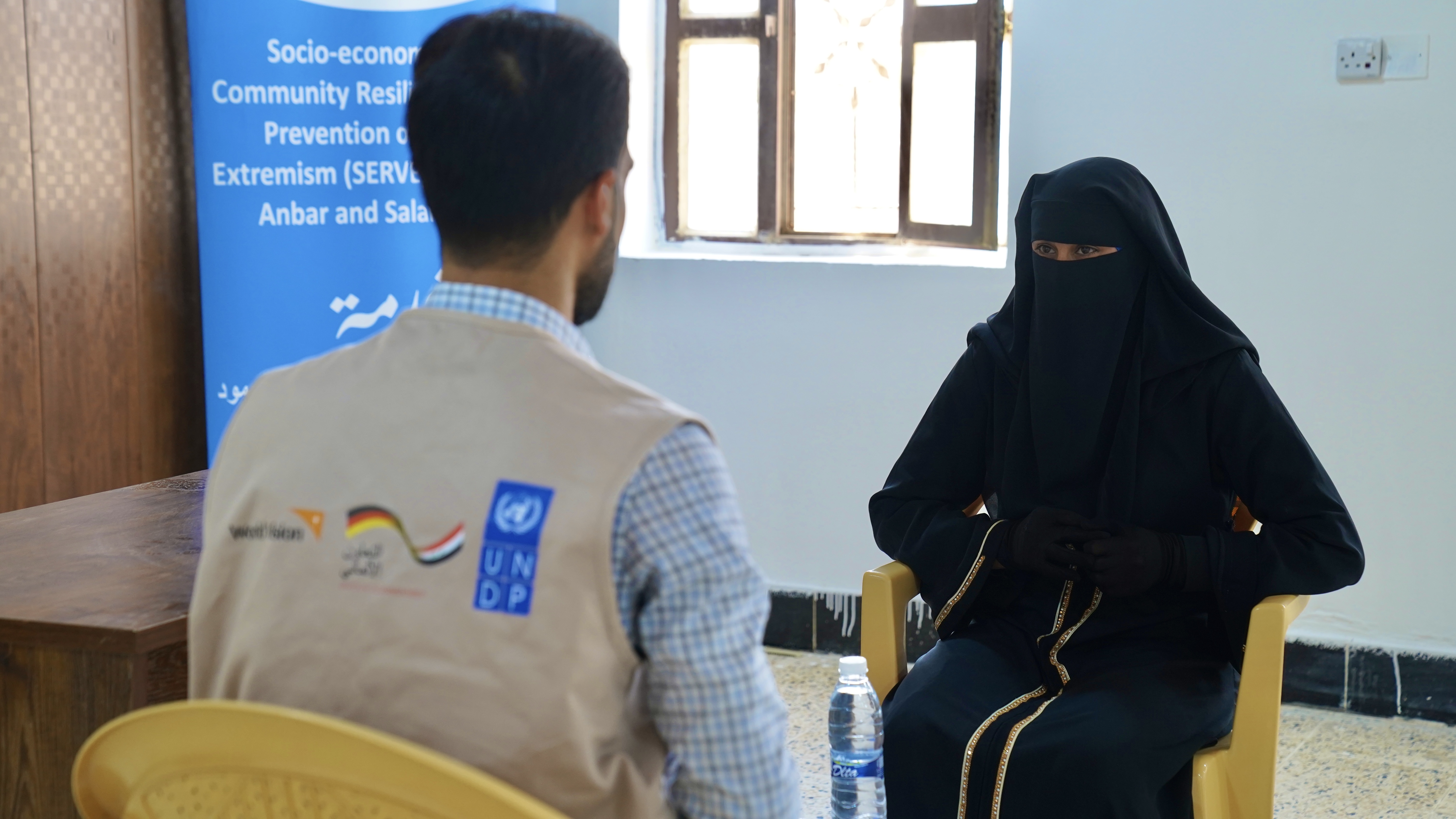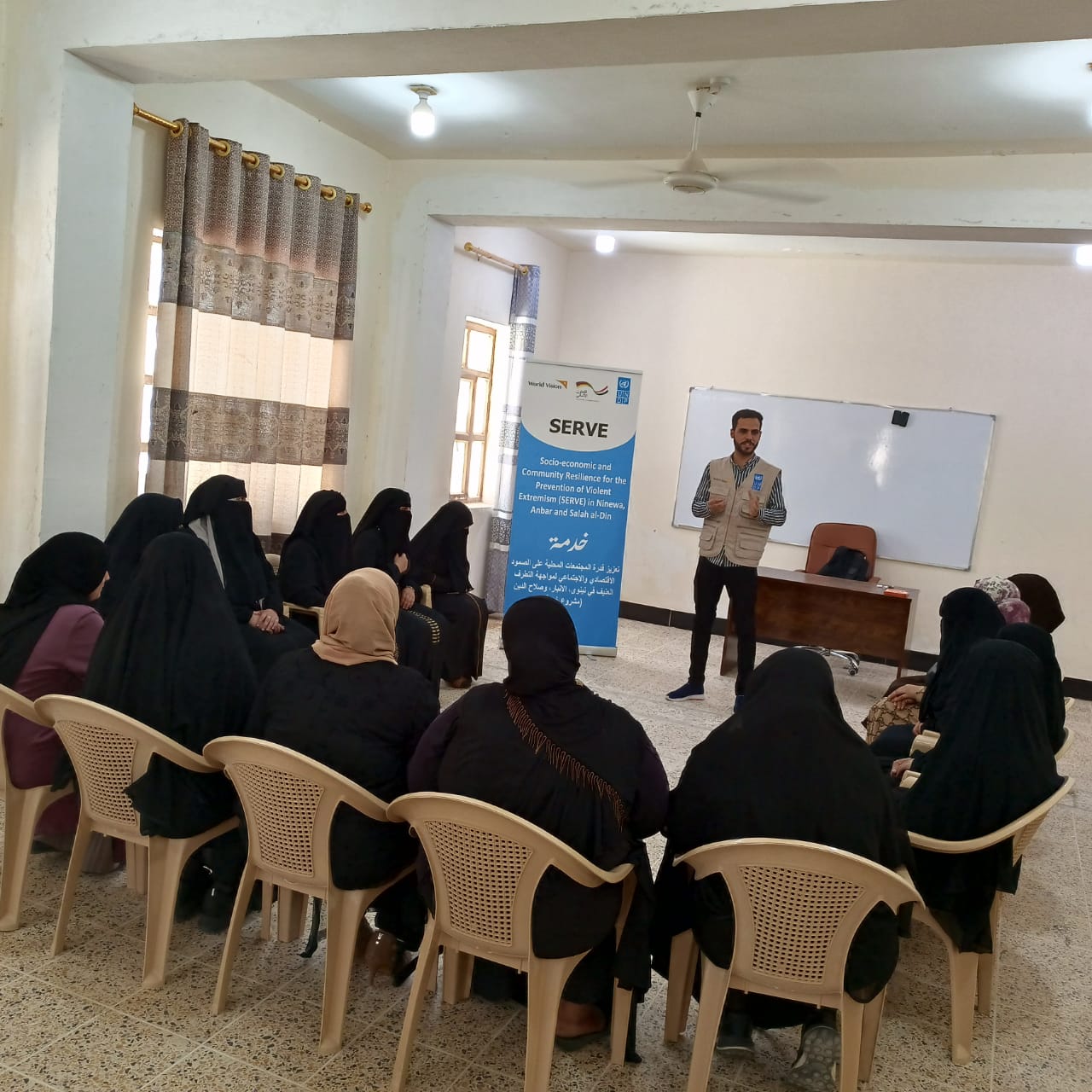Reconstructing Lives and Strengthening Communities: Empowering Iraqi Youth through Mental Health Services and Skill Development
November 19, 2023

Ms. Omar receives psycho-social support from one of the Implementing Partner counsellors. Through UNDP support, she has been able to settle back home with her family.
At the end of the conflict in Iraq, a number of young, widowed mothers returned home.
While returning home should be joyful, for many, home was not the welcoming place they had hoped it would be.
Restoring Hope after loss – Om’s story
This was Om Omar’s story. The 28-year-old widow and mother of three returned from Al-Hol camp in 2020 after the death of her husband and one of her sons.
‘My family and I faced rejection and discrimination from everyone, even from our relatives,’ she explained, ‘receiving mental health and psycho-social support helped me to deal with the pressure, understand myself, and start addressing my problems one by one.’
Om Omar’s story is not an isolated one. Many young widows and families experience stigmatization and discrimination when they are perceived to have been affiliated with ISIL by virtue of marriage or relation to alleged fighters. This perceived affiliation acts as a painful obstacle for those who wish to not only return home but to reintegrate into their local communities. The rejection they experience at the hands of people they know, and love creates anxiety and emotional stress, an added burden to an already difficult life.
UNDP’s support to returnees in Iraq which includes Mental Health and Psycho-social Support Services (MHPSS) helped Om Omar and 300 more individuals through this emotional ordeal.
UNDP’s MHPSS interventions are embedded in its peace and social cohesion programmes as a way of fostering resilience for returnees and their families enabling them to be better integrated within their communities and promoting a sense of social unity, present before the ISIL conflict.

A Counsellor supports a group psycho-social training session for women in Anbar Governorate.
Receiving help they didn’t know they needed
Mental health and psychosocial support is not something that is commonly available or known in Iraq or the region as a whole. In certain parts of the country, there is a stigma that still exists when people seek support for their mental health.
In Iraq, UNDP’s efforts ensure that communities are aware of the existence of MHPSS services as well as the benefits of undergoing such support and training.
In Iraqi society, women more often than men, bear the burden of emotional stress brought about by the daily challenges and struggles they face as heads of households. Being both the father and the mother of the family is an enormous responsibility, emotionally as well as financially.  The MHPSS services offered through support from UNDP have changed the lives of these women for the better, as they are trained in life and emotional skills, psychoeducation, individual and group sessions - which have helped them to understand that they are not alone, and they have the support they need to overcome the trauma they have faced.
The MHPSS services offered through support from UNDP have changed the lives of these women for the better, as they are trained in life and emotional skills, psychoeducation, individual and group sessions - which have helped them to understand that they are not alone, and they have the support they need to overcome the trauma they have faced.
In addition to MHPSS, UNDP provides the returnee families with vocational training to enable them to acquire knowledge and skills they can use to fend for their families.
‘I am now strong enough to face my challenges and with the training in sustainable agriculture, I will be able to support my family and feel like a member of my community once again,” Om declared.
Hope after Displacement – Saad’s story
Settling back home after years of internal displacement took a toll on many other young people.
For Saad, a young man from Baiji in Salah al-Din, five years of living as a displaced person in Kirkuk took a toll on his mental health. The loss of family and personal property during the conflict deteriorated his mental health further.
“I was initially hesitant to participate in the project, everything seemed dark, and I had no desire to take part in life outside my home,’ the 24-year-old shared.
With some persuasion, Saad finally joined the counselling sessions. The first sessions helped him to understand what was going on inside of him and together with the clinical psychologist, came up with a treatment plan.
“That treatment plan gave me back my life. I learned to love life again,” he declared excitedly.

A psycho-social education class for men in Mosul. These classes help the men understand what is going on in their minds and offer a platform to discuss how to overcome their traumas.
Saad was also one of those trained in sustainable agriculture – one of the vocational training activities provided alongside the MHPSS support.
 “The agriculture training has helped me to stay the course. It is an avenue to deal with stress and take care of myself and my family,” he said adding that it has also enabled him to build new friendships in the community.
“The agriculture training has helped me to stay the course. It is an avenue to deal with stress and take care of myself and my family,” he said adding that it has also enabled him to build new friendships in the community.
“I now feel psychologically stable and with my new skills, I hope to start a business soon,” he concluded.
UNDP’s support to these communities is touching lives and restoring hope. A total of 1,580 individuals have been provided with both MHPSS and vocational training support through UNDP’s Socio-Economic and Community Resilience for the Prevention of Violent Extremism (SERVE) Project.
The project which is implemented in Al-Qaim and Rummaneh districts in Anbar, Mosul district in Ninewa, and Baiji district in Salah al-Din also provides support through Cash for Work, business skills development, small business grants, and access to sustainable employment. It supports the most vulnerable groups including returnees, Internally Displaced People (IDPs), and host community members.
ENDS.
UNDP’s Socio-Economic and Community Resilience for the Prevention of Violent Extremism (SERVE) Project is part of its efforts towards building a peaceful and socially cohesive Iraqi society. Its work is made possible by the generous contributions of the Government of Germany (SERVE II) and the Government of Japan (SERVE I).

 Locations
Locations